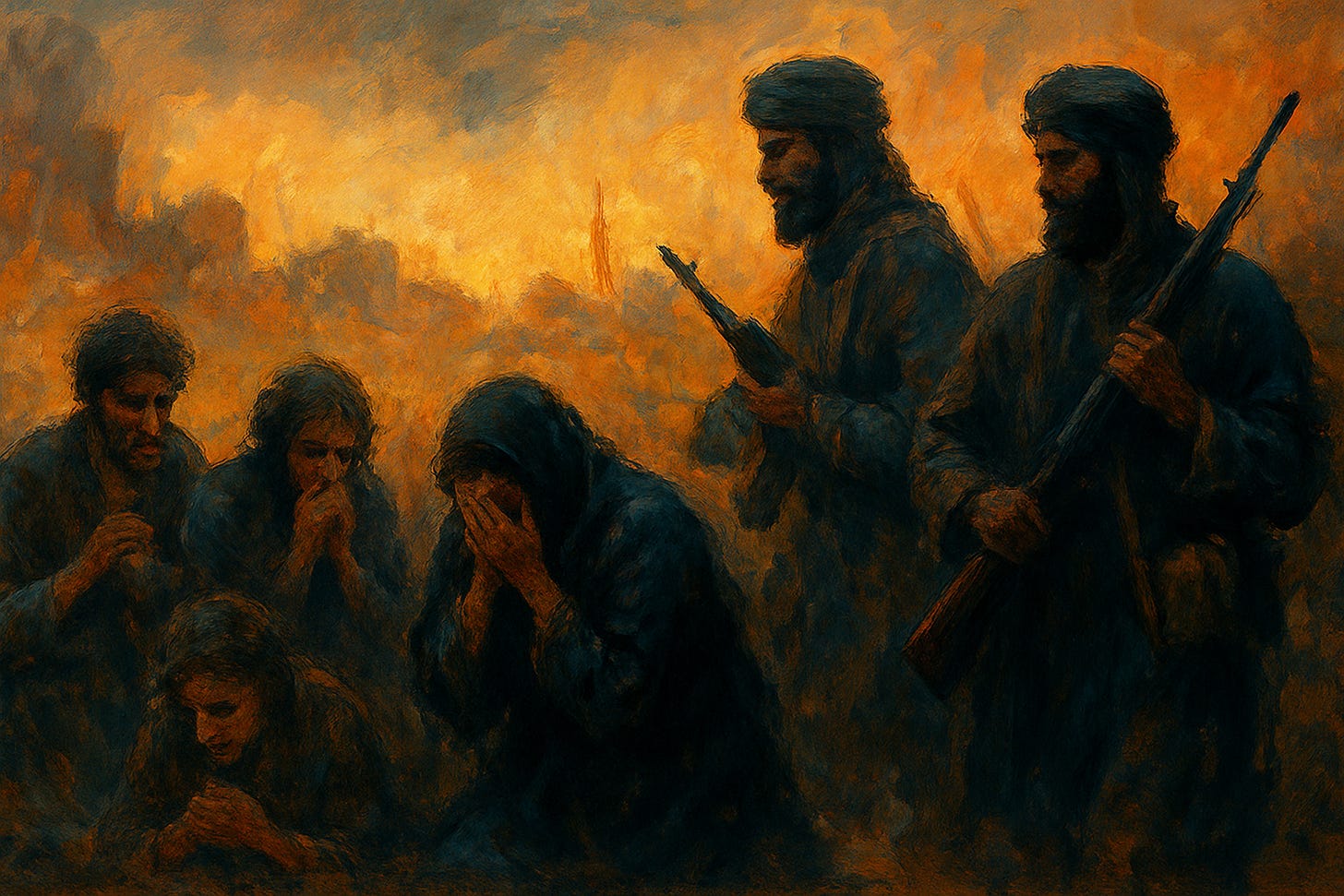Same Violence, Different Labels: How We Excuse Christian Societies But Blame Islam
The tendency to attribute violence to specific religious traditions says more about our analytical blind spots than about faith itself. We explain atrocities inconsistently, applying different standards depending on the cultural setting — obscuring more than we reveal.
The Problem of Selective Attribution
When Christians waged the Crusades, carried out the Inquisition, or justified colonial genocides, we now explain those atrocities as products of political ambition, economic interests, or cultural imperialism — not Christianity itself. Similarly, when Hitler and Stalin murdered millions, we don’t indict atheism or secularism; we call them political ideologies.
But when Muslims commit atrocities, we often leap straight to Islamic doctrine, treating religion as the primary causal force.
This double standard is analytically lazy. Violence isn’t uniquely Islamic — it’s uniquely human. Our explanations reveal our biases, not the underlying drivers of extremism.
The Cultural Substrate Argument
“Religious” and “secular” violence are less distinct than we pretend. Movements like Nazism and Soviet communism arose in deeply Christian cultural contexts. Even when rejecting Christian doctrine, their leaders inherited centuries of Christian-influenced ideas about hierarchy, sacrifice, salvation, and utopian redemption.
~ Hitler was raised Catholic.
~ Stalin trained for the Orthodox priesthood.
~ Most Nazi and Soviet elites grew up in Christian households.
These societies didn’t shed their formative cultural frameworks overnight. The same applies globally: no society escapes the gravitational pull of its dominant cultural-religious inheritance, even when new ideologies explicitly reject it.
Political Extremism and Religious Packaging
Islamofascism is not uniquely “Islamic.” It’s a political ideology that uses Islamic language and symbolism to mobilize followers — just as past Christian movements selectively quoted scripture to justify slavery, conquest, and genocide.
Even supposedly secular movements often took on religious forms:
~ Nazi “blood and soil” myths echoed Christian chosenness and divine mission.
~ Soviet communism replicated religion’s sacred texts, heresy trials, infallible leaders, and promises of paradise.
~ European colonialism fused Christian missionary zeal with imperial conquest.
The pattern is universal: political extremism adapts to its cultural environment. In Christian contexts, it borrows Christian patterns; in Islamic contexts, it borrows Islamic ones. The form changes, but the underlying dynamics — utopian visions, dehumanization of enemies, and pursuit of totalizing authority — remain the same.
The Progressive Paradox
If Islam itself caused Islamofascism, one inconvenient fact shouldn’t exist: Western progressives.
Large numbers of secular Western leftists, with no connection to Islam, routinely defend Islamist movements and leaders. These same progressives champion women’s rights and LGBTQ+ equality, yet side politically with groups that explicitly oppose both.
They’re not moved by Islamic theology — most can’t even read Arabic. They’re responding to narratives about anti-imperialism, resistance to Western power, and solidarity with the “oppressed.”
This is decisive: if Islam alone explained Islamofascism, these alliances wouldn’t exist. The appeal is political, not doctrinal.
The Muslim Reality
Ordinary Muslims overwhelmingly reject Islamist extremism:
~ Polls show low support for extremist groups.
~ Muslim-majority governments have fought and defeated them militarily.
~ Most victims of Islamist violence are other Muslims.
~ Millions flee Islamist rule when they can.
~ Islamist regimes are celebrated when they fall.
If Islam inherently produced violence, we would not see Muslims fleeing, fighting, and dying to escape Islamist regimes.
A Better Lens
Instead of asking “Why does Islam produce extremism?”, we should ask:
“Why do certain political and social conditions allow extremist movements to weaponize whatever cultural symbols are available?”
Whether religious, nationalist, or secular, extremism thrives when:
~ Power vacuums open political opportunity.
~ Societies are destabilized by war, humiliation, or occupation.
~ Cultural frameworks provide ready-made symbols to rally followers.
Religion is a tool. The deeper drivers are political opportunity, social context, and human psychology.
Conclusion
We distort reality when we treat Islamic violence as uniquely caused by Islam. Applying consistent analytical standards reveals a universal truth: extremism borrows the language and symbols of its host culture, but the underlying dynamics — power, identity, utopian promises, and dehumanization — are the same everywhere.
Moving beyond religious essentialism doesn’t excuse Islamist extremism. It explains it — and, more importantly, helps us understand why it looks different in different cultural contexts, while operating from the same universal human script.


